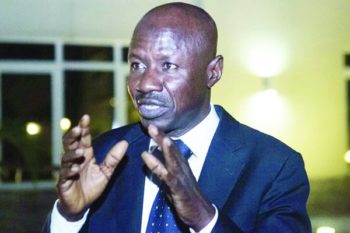
By Lakinbofa Goodluck
If you ask an average Nigerian to name three problems facing this country, corruption will certainly be one. The fight against corruption is not a new phenomenon in Nigeria. Virtually, every leader since the first military coup indicated commitment to fighting corruption. From Major Chukwuma Nzeogwu who spearheaded the first coup to the eventual beneficiary Major General Aguiyi Ironsi, all indicated their intent to fight the corruption that had permeated the political sphere in the country. The corruption tag was so loud that popular columnists such as the highly respected Tai Solarin at some point welcomed the military intervention. Administration after administration alluded to the corruption in the system and their resolve to fight the scourge head on. And eventually, rather than build a country on strategic and visionary infrastructural development agenda, our nation has been electing, selecting and accepting leaders based on a promise to fight corruption. So we focus less on development. More than 50 years after, our country still battles with the same rhetoric – fighting corruption and providing basic social amenities. Ironically, while corruption keeps growing with impunity and nepotism as the most prominent members of the clan, basic social amenities have become a mirage.
Distressingly, it appears difficult to even trace the origin of corruption in Nigeria. Some people have blamed the colonialists for introducing corruption into our society. Others believe it is normal for humans to exhibit bad behaviour, which is all part of corruption. But the truth that must be appreciated is that Nigeria is not the only corrupt country, and we are not the most corrupt country in the world. We only remain an unfulfilled nation because we have condoned and rewarded corruption. No administration in Nigeria since independence has been able to fight corruption without leaving a corrupt trail for the next administration to reveal. We only find out about the magnitude of corruption in the current administration when the next one comes in. The problem has always been the manner in which every administration comes in to fight corruption and ends up perpetuating the same corruption. Our strategy has been “To fight them and protect us.” So every administration protects its people (us) and fights corruption among perceived opposition (them). And as a result, we have collectively created the notion that corruption is part of our corporate existence and we have to live with it.
One of the biggest marketing strategies that won the 2015 Presidential Election for President Buhari was the popular perception that he would fight corruption to a standstill. But disappointingly, the President has continued to play out the same script that has been in use since independence – the “us” versus “them” script. What this philosophy does in the fight against corruption is that only the people that are perceived to be enemies of the government in power can be prosecuted for corruption. Regardless of the magnitude of allegations and revelations against anyone in team “us”, the person can be guaranteed of a lasting verdict of innocence. The only requirement to sustain the verdict is to always belong to team “us”. Even when there is a public correction to maintain political correctness, the mistreated team member will be rewarded secretly for taking the role of a lead character in the whole drama. This is why politicians in our country keep moving from one political party to the other especially from opposition to ruling party because that is always where the protection lies.
When the revelation of complicity in the management of funds for the Internally Displaced Persons (IDP) against the former Secretary to Government of the Federation (SGF) became a public debate, the President was quick to write to the National Assembly absolving the SGF of wrongdoing in spite of the facts in the public domain. And when he finally got suspended, the former SGF was bold to ask “Who is presidency?” That is to show how entrenched some individuals may be in government such that it will always be difficult to get them out so long as they belong to “us”. While Nigerians were still battling with the “SGFgate”, Mainagate became a trending story and up until this moment, the most sought former civil servant has suddenly become the most difficult to locate. Maina’s family has stated that their son, being an “adroit” civil servant, was invited by the current government to serve. Even our almighty EFCC has said some people are shielding Maina from arrest. Well, the reality that we may have to deal with is that Maina may not be found until he changes camp from “us” to “them”.
The problem we keep having in our fight against corruption is our perspective to the scourge. We have often defined corruption narrowly as stealing or embezzlement of government funds when in actual fact it goes beyond that. This is why our strategy to fighting it has not worked since independence. We can never win the fight against corruption in this country so long as we employ the strategy of “us and them” because the strategy is actually the lifeblood of corruption.
Copyright Ships & Ports Ltd. Permission to use quotations from this article is granted subject to appropriate credit given to www.shipsandports.com.ng as the source.